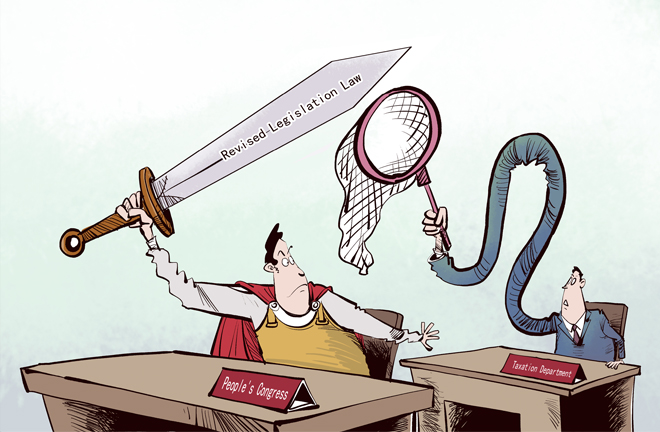Amended Legislation Law to promote legal reform

Do not randomly use power
Many a law and regulation,
Arises from haphazard legislation.
Special groups, departments, and regions;
Their number is many;
Their interests are legion.
Legislative contradiction,
Is a constant source of friction.
And illegal taxation,
Is a constant source of consternation.
The law must be clearly wrought,
Or there will be questions,
“Is it legal or not?”
The Legislation Law, newly revised,
Means rule of law in the public’s eyes.
Because to draft capricious law,
Is indeed a fatal flaw.
Good law is the only solution,
It means the next step of evolution.
(Cartoon by Gou Ben; Poem by Long Yuan)
China adopted a draft amendment to the Legislation Law at the closing meeting of the third annual session of the 12th National People’s Congress (NPC) on March 15. The move symbolizes the country’s newest legal reform ambitions.
About 3,000 NPC deputies overwhelmingly voted for the bill, with 2,761 in favor, 81 against and 33 abstentions.
The Legislation Law, enacted in 2000, was tabled for revision twice in August and December 2014 respectively. The law is at the foundation of China’s legal system, regulating how national laws, government regulations and local laws come into shape and which organizations hold legislative power in the country.
Amending the Legislation Law represents China’s determination to advance the rule of law. The Legislation Law has been amended to ensure that all reforms are legitimate as new ones are passed.
Ensuring statutory taxation
Ensuring statutory taxation is one of the most important articles in the draft amendment. Tax can only be levied or canceled through the law and the basic tax system can only be decided by the law, under the draft amendment. Clauses regarding this issue are placed after the people’s political rights and personal rights, reflecting a key change to legislation.
The draft amendment submitted for the reading had not regulated the tax rate but it was written in the final version because of a strong push from NPC deputies.
“There are three taxes levied through legislation including individual income tax, corporate income tax, and vehicle and vessel tax among the total of 18 existing taxes,” said Hou Xinyi, deputy dean of the School of Law at Nankai University.
In the 1980s, the NPC approved the State Council issuing formal or provisional regulations to levy tax. These years, more than 10 taxes were successively imposed by the State Council.
In the following decades, both the legislature and public have realized the urgent need to establish a complete statutory tax system. In 2013, the Communist Party of China Central Committee required the principle of statutory taxation to be further realized.
“Tax is an important issue related to people’s property rights. Ensuring statutory taxation will protect all people’s core interests,” said Wang Mingwen, a professor from the School of Economics and Management at Xichang College in Sichuan Province.
According to the timetable, China aims to realize full statutory taxation by 2020. Experts predict this will have a long-lasting impact on Chinese society.
Limited administrative rules
Apart from tax, other administrative institutions that influence people’s daily lives are also expected to face tighter regulation under the amended Legislation Law. Ministries and local governments will be banned from issuing rules and policies that mitigate people’s rights or increase their obligations without foundation.
Under the premise of promoting economic development and social management, some local governments have approved controversial rules and policies.
For example, currently some Chinese cities restrict the number of properties individuals can purchase to limit real estate speculation. Some cities also ban residents from buying cars to ease congestion and reduce air pollution.
“These actions actually limit civil rights, including the right to own a vehicle, and is not conducive to comprehensively advancing the rule of law,” said Hou.
However, the draft revision allows local governments to issue temporary rules only in the case of an emergency. These rules will expire in two years unless winning long-term approval from local legislatures.
Giving more cities legislative power
Giving more cities legislative power is the third highlight of the draft amendment. According to the draft amendment, legislative power will be expanded from 49 bigger cities in China to 284 nationwide, empowering legislatures to make local laws. However, the legislative power of cities must be approved by provincial legislatures.
Some Chinese cities have been striving for local legislative power for a long time. “Due to different situations in different cities, existing laws cannot cover every aspect of social management and different cities are pushing for local laws to solve their problems,” said an anonymous official from the Ningxia Hui Autonomous Region.
The draft amendment restricts power to issuing local laws on rural and urban development and management, and environmental conservation of historical heritage and culture values.
“With legislative power, our city can convert some pilot policies to a more permanent arrangement and address new problems that other cities may not have,” said Zheng Xuejun, a NPC deputy from Wenzhou, Zhejiang Province. Due to its vigorous private businesses and strong entrepreneurship tradition, Wenzhou is regarded a testing ground in China for bold economic reforms.
However, Wang said within the new legislative model, there are two issues worth attention: prevention of abusing this power and the abilities of different cities to legislate.

 PRINT
PRINT CLOSE
CLOSE